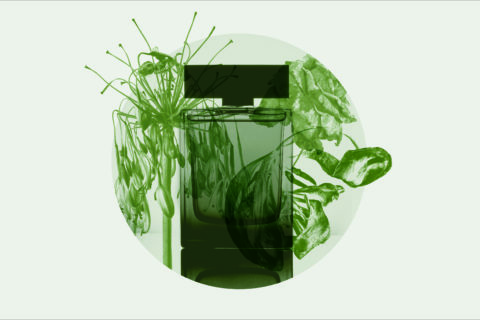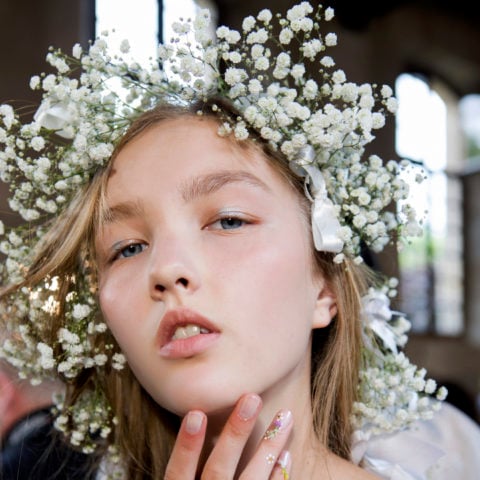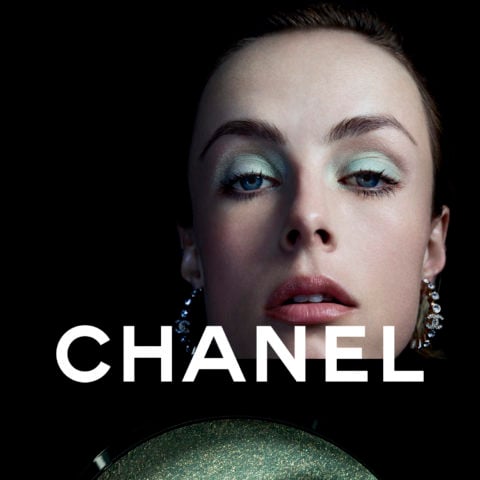Weird Perfumes are Taking Over
Forget common fragrance notes like rose, vanilla and patchouli. Isabel B. Slone explores a growing trend in the world of perfumery: scents that are, well, kind of gross.
Courtney Rafuse loves the smell of rot. The Toronto-based perfumer has been mixing up spicy, skunky potions for her brand, Universal Flowering, since 2016. Rafuse is known for creating challenging scents that contain notes of blood (cleverly described as “copper wire accord”) and sweat. Reviewers have described her fragrances as smelling like “Barbie in the microwave.” Yet despite their prominent elements of filth and decay, Universal Flowering perfumes are considered anything but fetid. Rafuse once received an Instagram DM from a customer recounting how a new lover was so smitten by her scent that he proceeded to lick every inch of her body.
Universal Flowering is part of a new and growing guard of perfume brands that have begun to incorporate unconventional notes into their wares. But the world of fragrance is no stranger to ingredients of unsavoury provenance. Take, for instance, ambergris — harvested from the intestines of a whale — which has been used in perfume since the 10th century. Or civet oil, a secretion derived from the perineal gland of a civet cat that features a mind-controlling parasite called Toxoplasma gondii, which has been used in perfume for hundreds of years. (It was one of the main notes in Chanel No. 5 until the brand switched to a synthetic version in 1998.) But common notes like vanilla, amber and rose are increasingly being replaced by uncanny bouquets of semen, ashes, cocaine, plastic and flesh.
Historically, perfume is based on the premise of covering up unpleasant bodily smells and replacing them with something sweet and seductive. But in recent years, perfume itself has begun to get down and dirty and embrace the downright abject. While Thierry Mugler’s Mugler Cologne, which contains an “S” note widely rumoured to be sperm, launched back in 2001, there is now a profusion of similar scents on the market. Brands like Marlou Paris traffic in the scent of bodily secretions, Wolf Brothers produces animalic scents with names like Bear, Goat and Boar and niche brand Akro bottles the scent of vices like alcohol and cigarettes.
Perfume is about storytelling. Every story has to have contrasting elements of darkness and lightness.
“Back in the day, a little bit of naughtiness was good for balancing a gardenia or a tuberose, but now it has kind of flipped and there’s less floral and more funk,” says Callum Rory Mitchell, the nose behind Perdrisat, an Australian small-batch-perfume brand founded in 2022. For a scent called Fuck Boy, Mitchell was inspired by the acrid chemical smell of cocaine to turn the cloying pina colada scent given off by the typical Australian fuckboy into something a little bit nastier. It wasn’t intended to be louche but, rather, a character sketch of a relentless partygoer. “Perfume is about storytelling,” he says. “Every story has to have contrasting elements of darkness and lightness.”
Despite their use of off-putting ingredients, the perfumers creating these unique scents aren’t aiming for an end product that smells horrific; in fact, it’s quite the opposite. In her landmark essay “The Powers of Horror,” Julia Kristeva notes the fine line between arousal and disgust. The abject “is something rejected from which we do not part.”
The curiosity driving this rank-smelling renaissance is due in part to #PerfumeTok, which opened the floodgates for an entirely new audience to get into the previously insular world of perfume, and in part to the legions of new fans desiring more complexity in their bouquets. “I think people’s noses are getting a little more sophisticated and adventurous in general,” says Alana May Johnson, an L.A.-based librarian and fragrance fan.
Historically, the perfume world, which is expected to grow to $49.2 billion by 2029, has been led by big names like LVMH, Coty and L’Oréal. Now, an increasing market share is being snapped up by a burgeoning wave of niche noses who brew perfume like it’s bathtub gin. Indie perfumers aren’t restricted by the same constraints as their conglomerate counterparts and have the freedom to create scents that are more outré and experimental. “A lot of traditional perfumers will say ‘I grew up in the south of France, surrounded by beautiful flowers.’ Those aren’t my childhood memories. I grew up in Missouri playing with pyrotechnics,” says Mark Sage of Clandestine Laboratories, whose Wendover scent is meant to smell like a “damp basement.”
Ultimately, the role of perfume has shifted from being a normal part of a beauty routine to an artistic medium and a form of self-expression. It’s no longer about smelling sweet; it’s about showing who you are to the world, whether that’s macabre, saccharine or anything in between.
“I like leaning into the stinkier sides of a flower — the parts that are a bit pissy or bodily or sexy — to not just make perfume pretty but make it feel more alive,” says Rafuse. Besides, if we can’t completely rid ourselves of grime, perhaps the next best thing to do is embrace it. Perfumes that contain taboo elements offer us a chance to celebrate our inherent humanity — with all the filth and transcendence contained therein.
This article first appeared in FASHION’s November 2023 issue. Find out more here.








